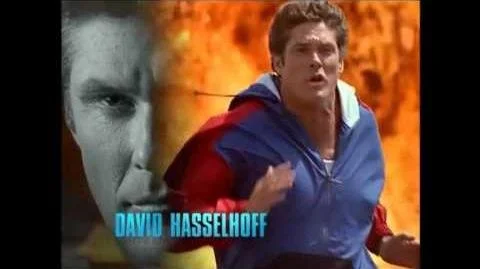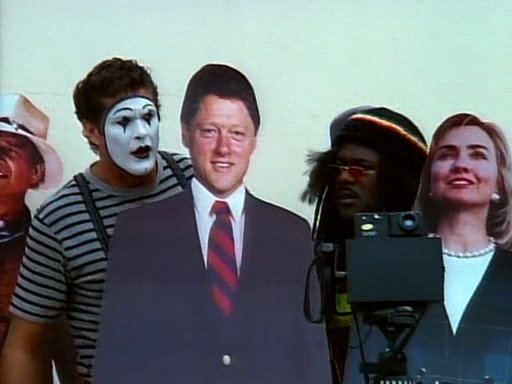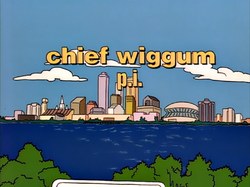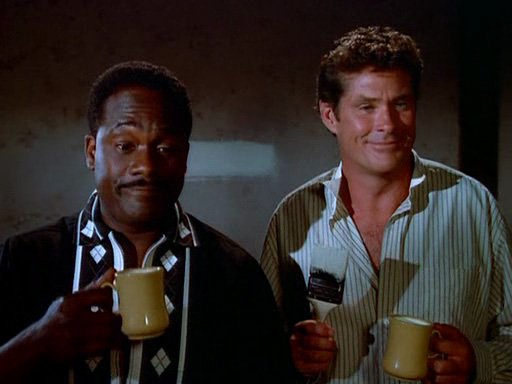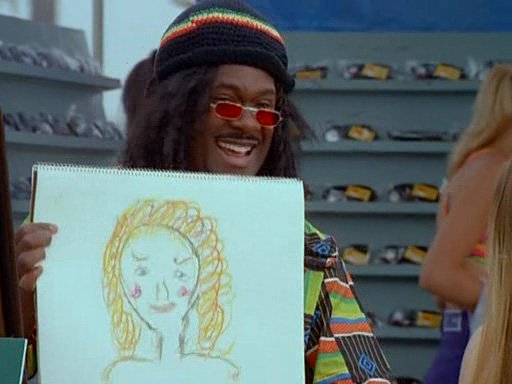The First Season of the Notorious Spin-Off Baywatch Nights is Pure Kitsch Joy
#Squadgoals
Despite devoting a sizable chunk of my life to documenting the insanity of Baywatch Nights’ supernatural second season for this book, I had no intention of watching any of its first season, let alone covering it.
Why would I? Compared to “Baywatch is The X-Files now, David Hasselhoff is David Duchovny and they’re fighting monsters every week,” turning a lifeguard adventure show into a cheesy 1980s-style interracial detective romp is comparatively predictable and sane.
But, as it so often does, curiosity got the best of me, and I resolved to watch and write about one episode of Baywatch Nights. I was instantly hooked. Before it made the regrettable choice to go spooky, Baywatch Nights was a masterpiece of accidental but utterly inspired self-parody.
If you were to slap the words “Adult Swim Presents” on the opening credits of “Pursuit,” the first episode to air, geeks and hipsters would declare it the most brilliant exercise in gleefully postmodern television satire this side of Lookwell and Heat Vision and Jack.
Hasselhoff would receive the best reviews of his career for the light touch he brings to this boldly stupid new vision of life for iconic lifeguard Mitch Buchannon, a winking self-awareness that suggests he knows just how ridiculous everything around him is and is having a goddamn blast.
How did a show whose star happily slathered on white face-paint to play an undercover mime, performed show tunes in drag while wearing a bulletproof vest, and joined his partner in donning chicken-themed fast-food get-ups turn into a science-fiction downer that refused to acknowledge even the possibility that there might be something silly about David Hasselhoff fighting mummies, vampires, unfrozen viking warriors, space aliens, and an evil CD-Rom game?
In its second season, Baywatch Nights wasn’t just a very different show: it was the antithesis of its first season. A show that didn’t take anything seriously, particularly itself, somehow morphed into a science-fiction monstrosity that took everything seriously, no matter how ridiculous.
Among its many fascinating miscalculations, the second season of Baywatch Nights made the fatal mistake of not letting David Hasselhoff be David Hasselhoff.
The infinitely superior first season, in sharp contrast, empowers Hasselhoff to be himself to the nth degree. Like Adam West, Bruce Campbell, or William Shatner, David Hasselhoff is a personality more than an actor.
Hasselhoff doesn’t disappear into roles. Instead, roles disappear inside the Knight Rider star’s impossibly vast, hammy persona.
In Baywatch Nights, Hasselhoff’s partners are Garner (Gregory Alan Williams), a black guy; and Ryan (Angie Harmon), a sexy, no-nonsense lady, but tonally and thematically they should be played by The Simpsons’ Troy McClure and Joe Camel.
That’s because Baywatch Nights is essentially a straight-faced version of Chief Wiggum P.I. from the legendary “The Simpsons Spin-Off Showcase” episode of The Simpsons—that is, if anything in Baywatch Nights can be deemed straight-faced.
Only instead of Springfield’s most inept crime fighter relocating to New Orleans and setting up shop as a private investigator, hotshot lifeguard Mitch is moonlighting as an overworked, underpaid gumshoe handling Malibu’s sexiest, tackiest crimes.
If Joe Camel were a television producer instead of a disturbingly phallic, unnecessarily sexual cigarette spokesperson for small children, Baywatch Nights is a show he would create. Baywatch Nights is the television equivalent of a Camel print ad of camels relaxing at a club where the blues is hot, the jazz is cool, and the taboo sex between Joe Camel and human women is hotter for transgressing every law governing the co-fraternization of man and beast.
Baywatch is less a television show than a Man Cave in television form that contains everything Hasselhoff loves in one place: hot tunes, cold drinks, designer duds, sports cars, beautiful babes, and light action executed with a wink and a goofy smile.
When Baywatch Nights debuted, Hasselhoff was bored with Baywatch, and producers were eager to hold onto him before he bolted his billon-dollar baby to become an A-list movie star with a shelf full of Academy Awards, so they gave him carte blanche to do whatever he wanted with a spin-off.
The problem, from a commercial standpoint at least, was that Baywatch Nights was created to please Hasselhoff rather than audiences who might understandably be confused as to why the lifeguard show with all the boobs was now a detective show.
In “Pursuit,” Baywatch Nights’ premiere, Hasselhoff addresses the audience directly to explain how Baywatch became Baywatch Nights in the most exquisitely half-assed manner imaginable.
Oozing Troy McClure smarminess, Hasselhoff confides in us, his friends in the audience, “You know some people think the beach closes after the sun goes down. Uh uh. That’s when it really starts to heat up. Especially if you’re a PI. Now I know what you’re thinking: Mitch is a lifeguard. What does he know about being a PI? Well, they both involve rescuing people.
It turns out my best friend Garner went partners in a bankrupt detective agency with a beautiful brunette PI (Angie Harmon as Ryan) who left New York for the California sun and adventure. What can I say? When someone yells ‘help’ I jump in with both feet! And I hope you do too as we introduce a new series of private eye adventures called Baywatch Nights! Sit back and ENJOY the ride.”
You’d think it would be impossible to sustain that level of camp good-badness for an entire episode, let alone an entire season, but Baywatch Nights accomplishes that feat with twenty-two episodes of pure kitsch bliss.
In the beginning music was central to Hasselhoff’s vision. Hasselhoff had been hanging out at the House of Blues when Baywatch Nights was being conceived and was infected with its conception of the blues as corny music for lame white people rather than as a raw, authentic expression of black pain.
Baywatch Nights was the most mid-1990s show possible, but it’s so deliriously retro that it also feels like a spectacular symphony of silliness that could have aired in 1985 or 1975.
If Baywatch Nights had aired in the mid-1980s, right after Knight Rider, then its curious conviction that drag and hip-hop were both crazy fads on their way out would make more sense.
In an episode where Hasselhoff wears a bulletproof vest under a slinky dress while going undercover to catch a killer of drag queens, one-hit wonder Skee-Lo auditions to perform at Lou Raymond's (Lou Rawls) club Nights with a spirited performance of “I Wish.”
Listening to Skee-Lo, Ryan sports an expression that conveys, “I’ve never heard of music where people ‘talk’ rather than sing before, but I kind of like it! It’s fun!”
The club owner with the million dollar voice is less impressed, however. He doesn’t even let Skee-Lo finish the only song he would ever be known for. Instead, he brusquely cuts him off and coldly admonishes him to listen to some “Muddy and some T-Bone” before befouling his sacred stage with his infernal “rap” claptrap again.
Skee-Lo sports an appropriately ashamed expression that just as incontrovertibly says, “I’m sorry for wasting your time, Mr. Raymond, Sir. I’ll learn a real instrument so I can play real music and will forget about all of this ‘Hippety Hop nonsense.”
Maybe Skee-Lo should have sought out one of the show’s many white child blues prodigies so that a twelve-year-old white moppet from Australia could teach him to play black music with authenticity and conviction.
Late in “Blues Boy,” the aforementioned white orphan is playing a lonesome tune; the music is so powerful that it inspires Proustian reveries for Mitch, Garner, and Ryan.
Over a sultry, sexy, wildly inappropriate groove, Ryan thinks back to frolicking with her naval officer dad in his dress whites with an expression that is disturbingly, unmistakably sensual.
The look on Harmon’s face says so much more than it’s supposed to. It’s supposed to convey, “I love my dad.” Instead, it insists, “I know he’s my father and all but, damn, did the man look good in a uniform! No wonder I have daddy issues and lust after a man twenty years older than me!”
I don’t want to single Harmon out for criticism because she is a revelation here: funny, smart, sexy in an incongruously grown-up, understated fashion and able to make her character’s intense attraction to Mitch less icky than it should be.
Anyone who can hold onto their dignity in a scene where they try to convince their macho black male partner to dress up like Whoopi Goldberg to go undercover at a drag show is destined for bigger and better things.
Ryan is SO unbelievably attracted to Mitch that it becomes a problem. Sure, he’s played by an actor literally old enough to be her father, on his third hit television show, but how is she supposed to look at her divorced, forty-three-year-old single father coworker and not want to jump his bones, consequences be damned?
She’s not alone! Baywatch Nights’ first episode finds Mitch succumbing to the sexual advances of a femme fatale played by guest star Carol Alt. The sex symbol’s seduction techniques include a private swimsuit fashion show for the character played by Baywatch Nights’ star, co-creator, and executive producer.
This establishes a sturdy template: an impossibly beautiful sexpot will throw herself at Mitch in a cynical attempt to draw attention away from her crimes. Mitch will submit but look very sad at the end when she’s led away in handcuffs, leaving him to drink away his pain at Nights and nobly resist Ryan’s sexual advances.
In “Just a Gigolo” Mitch starts charging beautiful women for his sexual favors by going undercover as a male prostitute.
The first credit that comes up at the end of every episode is Hasselhoff’s for Executive Producer, something that plays unintentionally like a self-deprecating running joke.
OF COURSE David Hasselhoff would be behind a show where David Hasselhoff drives a cool car, wears designer suits, hangs out in a cool blues club with his buddy Lou Rawls, catches bad guys, and entertains scores of gorgeous, scantily clad women.
The first season of Baywatch Nights is a glorious, glorified midlife crisis. It’s pure wish-fulfillment, the entertainment answer to a long ponytail, sports car, and much younger girlfriend.
Watching Baywatch Nights, I felt like it was created exclusively for me. Whoever cast the show’s guest stars seemed to possess a direct line to my subconscious.
The second episode, “Bad Blades,”casts the actor who played J. Peterman on Seinfeld as the evil overlord of an international criminal gang made up of the most extreme athlete/criminals in the world and Jason Hervey as a rich rollerblading doofus under his spell.
Nancy Cartwright, Bart Simpson herself, sells carnal fantasies by the minute as the guest star in an episode devoted to the steamy world of phone sex, but, thankfully, Cartwright does not do phone sex as Bart Simpson. It would be very disconcerting hearing THAT voice purr, “Eat my shorts! Oh yeah, eat my shorts, baby! Aye Carumba! I am having a cow right now. I am having a cow SO HARD!”
Michael Winslow pops up randomly as a tech guy with a predilection for elaborate sound effects, and it’s always great to see Charles Fleischer, the voice and soul of Roger Rabbit, make an appearance as a weaselly career criminal.
But no Baywatch Nights guest makes as indelible an impression as Geraldo Rivera. When I saw the man who opened Al Capone’s vault’s name in the credits of “Payback,” I naturally assumed that he would be playing the same role he plays in everything: pompous, mustachioed boob Geraldo Rivera.
I was delighted to discover just how wrong I was. Rivera doesn’t just act in “Payback.” He ACTS! He’s a thespian giving it his all in the histrionic role of Albert Romero, an old rival of Mitch’s who comes to him seeking help when his much younger trophy wife goes missing.
Introduced holding a bucket of Kentucky Fried Chicken and a bouquet of flowers for his missus and then tumbling gracelessly to the floor when he sees she’s being held at gunpoint by ancient mobsters, Rivera commits to the role’s melodramatic emotions with wildly misplaced conviction.
It’s pure soap opera as the FOX “newsman” emotes as if he was promised his own spin-off if he only delivered a big enough performance as a man traumatized to discover that Bobbi, the woman of his dreams, has a seedy past as a kept woman who speaks many languages and has MANY frequent flier miles.
“Bobbi, part of me feels like I don’t even know you anymore! Farsi? Mandarin? Nearly a million frequent flier miles? Stripping in a club?” the diminutive schmuck asks his hot, mysterious wife. He then reassures her, “I would die for you baby!” in a manner even Tommy Wiseau might consider a bit much.
Midway through its first season Baywatch Nights did what failing shows generally do when it becomes apparent that what they’re doing isn’t working. They rearrange the proverbial deck chairs on the Titanic in a doomed attempt to stave off disaster.
They apply a cute little band-aid to a gaping chest wound.
The producers understandably figured that what this Baywatch by-product needed to bring in ratings was a busty blonde in her twenties who was married to a member of Motley Crüe.
So Donna D’Errico, the then-wife of Nikki Sixx, was added to the cast as Donna Marco, the new owner of Nights and a Baywatch babe in the classic mold, to the point that her character became a lifeguard and joined the cast of Baywatch for a few seasons.
D’Errico was joined by another twenty-something hardbody in Eddie Cibrian as hunky photographer Griff Walker, a cocky stud who wants to break into the detective business because in the mixed-up world of Baywatch Nights everyone wants to be a PI.
Baywatch Nights understandably assumed that it might be more successful if it had more in common with the most watched television show in the world. The line between Baywatch Nights and Baywatch began to blur and the shows began to overlap in cast, themes, and settings.
When it came to ratings, being more like Baywatch wasn’t the boost Baywatch Nights desperately needed.
Being nothing like Baywatch in its second season didn’t work either, but thanks to the extraordinary international success of Baywatch, Hasselhoff had the power and leverage to make his ridiculous fantasy of the ultimate David Hasselhoff vehicle a preposterous reality for forty-four episodes that must be seen to be believed.
I found Baywatch Nights so ridiculously enjoyable that at a certain point my enjoyment crossed the line from ironic to sincere.
I cordially invite all lovers of glorious trash to revisit an old series of private eye adventures called Baywatch Nights and ENJOY the ride.
If you dug this piece, then you will LOVE The Joy of Trash because it contains this article and plenty just like it!
Buy The Joy of Trash: Flaming Garbage Fire Extended Edition at https://www.nathanrabin.com/shop and get a free, signed "Weird Al” Yankovic-themed coloring book for free! Just 18.75, shipping and taxes included! Or, for just 25 dollars, you can get a hardcover “Joy of Positivity” edition signed (by Felipe and myself) and numbered (to 100) copy with a hand-written recommendation from me within its pages. It’s truly a one-of-a-kind collectible!
Or you can buy The Joy of Trash from Amazon at https://www.amazon.com/Joy-Trash-Nathan-Definitive-Everything/dp/B09NR9NTB4/ref=tmm_pap_swatch_0?_encoding=UTF8&qid=&sr= but why would you want to do that?
Check out my new Substack at https://nathanrabin.substack.com/
And we would love it if you would pledge to the site’s Patreon as well. https://www.patreon.com/nathanrabinshappyplace


